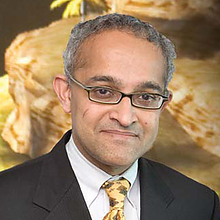V.S. Subrahmanian

As of August 1, 2017, V.S. Subrahmanian is at Dartmouth College.
http://web.cs.dartmouth.edu/people/venkatramanan-s-subrahmanian
Subrahmanian is a visiting professor in the Department of Computer Science and in UMIACS.
He is the director of the Center for Digital International Government (CDIG) and co-director of the Laboratory for Computational Cultural Dynamics (LCCD). From 2004 to 2010, he served as the director of UMIACS.
Subrahmanian's research is at the intersection of databases, artificial intelligence, and optimization methods with applications to tracking, monitoring and forecasting behaviors of terrorist groups, socio-cultural groups, global health care, and other areas relevant to most human beings.
His work in artificial intelligence spans rule-based expert systems and logic programs, nonmonotonic reasoning, probabilistic reasoning, temporal reasoning, hybrid reasoning, and software agents. Subrahmanian's database work focuses on heterogeneous database integration and interoperability, logic databases, probabilistic databases, and multimedia databases.
In the last few years, he has been studying how to reason about massive collections of multilingual document collections and mine them for sentiment/opinion information, as well as how to mine ontologies directly from text. Subrahmanian has been applying his work to the study of foreign cultures and terrorist groups with the intention of automatically extracting data about a group’s organization and activities, and mining this information in order to build stochastic behavioral models of the group which, in turn, can be used to come up with forecasts of future behavior of the group. His group has built several scalable systems for these and other purposes, which have been applied extensively in government and industrial applications.
Subrahmanian received the National Science Foundation (NSF) National Young Investigator Award in 1993 and the Distinguished Young Scientist Award from the Maryland Science Center/Maryland Academy of Science in 1997.
He received his doctorate from Syracuse University in 1989.
Publications
2003
2003. Probabilistically survivable mass. INTERNATIONAL JOINT CONFERENCE ON ARTIFICIAL INTELLIGENCE. 18:789-795.
2003. The CPR model for summarizing video. Proceedings of the 1st ACM international workshop on Multimedia databases. :2-9.
2003. A Deductive Database Approach to AI Planning. Journal of Intelligent Information Systems. 20(3):215-253.
2003. Secure agents. Annals of Mathematics and Artificial Intelligence. 37(1):169-235.
2003. PXML: a probabilistic semistructured data model and algebra. Data Engineering, 2003. Proceedings. 19th International Conference on. :467-478.
2002
2002. Presentation planning for distributed VoD systems. Knowledge and Data Engineering, IEEE Transactions on. 14(5):1059-1077.
2002. Improving Performance of Agents by Activity Partitioning. Technical Reports from UMIACS, UMIACS-TR-2002-96.
2002. Computational Logic: Logic Programming and Beyond, Essays in Honour of Robert A. Kowalski, Part I. :586-625.
2002. Agents dealing with time and uncertainty. Proceedings of the first international joint conference on Autonomous agents and multiagent systems: part 2. :912-919.
2001
2001. Optimal Agent Selection. KI 2001: advances in artificial intelligence: Joint German/Austrian Conference on AI, Vienna, Austria, September 19-21, 2001: proceedings. :2-2.
2001. Partitioning activities for agents. INTERNATIONAL JOINT CONFERENCE ON ARTIFICIAL INTELLIGENCE. 17:1218-1228.
2001. Provisional authorizations. E-commerce Security and Privacy. 2:133-159.
2001. Probabilistic Temporal Databases, II: Calculus and Query Processing. Technical Reports from UMIACS, UMIACS-TR-2001-79.
2001. Probabilistic temporal databases. ACM Transaction on Database Systems. 26(1):41-95.
2001. Probabilistic object bases. ACM Trans. Database Syst.. 26(3):264-312.
2001. Flexible support for multiple access control policies. ACM Trans. Database Syst.. 26(2):214-260.
2001. Temporal agent programs. Artificial Intelligence. 127(1):87-135.
2001. Probabilistic temporal databases, I: algebra. ACM Trans. Database Syst.. 26(1):41-95.
1995
1995. Combining databases with prioritized information. Journal of Intelligent Information Systems. 4(3):231-260.
1994
1994. Meta-languages, reflection principles and self-reference. Handbook of logic in artificial intelligence and logic programming. :323-358.
